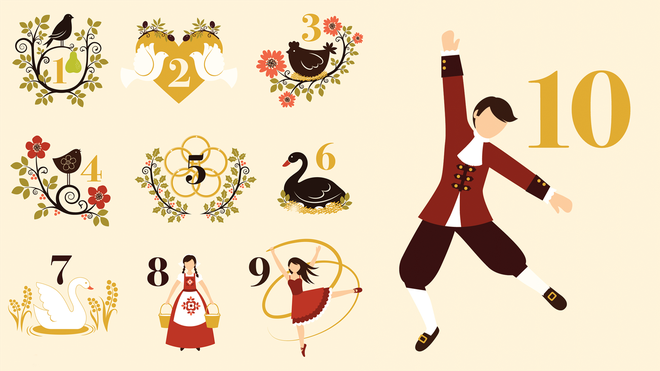
We all know the ‘Twelve Days of Christmas’ song, what is the story behind those sometimes bizarre lyrics? Leaping Lords await...
Twelve days of Christmas? ...we sing about them every year. But this Christmas it might be time for a deeper dive. Let’s discover that incredibly generous ‘true love’ who bestows the bunch of daily bizarre gifts on the song’s protagonist.
Who gets their true love 8 maids [who are] milking [a cow]? and where do you even get eight milkmaids from? Are they there by choice? Do we need to call the police?
Keep hold of those gold rings, as we break down the story behind one of the season’s most iconic songs.
When are the twelve days of Christmas?
The twelve days of Christmas are sometimes also known as Twelvetide.
There is a raging debate as to when exactly Twelvetide starts. While some would suggest the first day of Christmas is Christmas Day itself (25th December), the majority see 26th December as day one, meaning magic number 12 falls on the 6th of January; the traditional Christian feast day of Epiphany.
While not a celebration in itself, these twelve days are embedded into the culture of multiple Christian nations.
In the UK and other commonwealth countries, the 26th December is commemorated as the national holiday Boxing Day, while the 6th January, is seen as the last day you can have your Christmas decorations up by many European countries. And if you don’t take them down, some people think it’s bad luck.
This period has been recognised as a festive and sacred season since before the middle ages, with the twelve days from Christmas to Epiphany having first been proclaimed as such all the way back in 567AD.
The English carol
The first appearance of this seasonal song was actually, not as a song at all, but as a rhyme.
These lyrics were published in England in 1780 without music, and many composers would go on to write tunes for the words over the next 100 or so years.
However, the melody we most associate with this song is derived from a 1909 arrangement of a traditional folk melody by English composer, Frederic Austin.
The twelve verse song, as published in 1909 with the folk melody, describes the following gifts which are given each day;

- A partridge in a pear tree
- Two turtle doves
- Three French hens
- Four calling birds
- Five gold rings
- Six geese a-laying
- Seven swans a-swimming
- Eight maids a-milking
- Nine ladies dancing
- Ten lords a-leaping
- Eleven pipers piping
- Twelve drummers drumming
Read more:
So...what’s with the lyrics?
Some of the gifts given by the ‘true love’ are pretty self-explanatory. Five gold rings? Pretty cool gift. Three french hens? I've heard they lay delicious eggs, so that’s thoughtful.
But what could these strange gifts represent? Is there a deeper meaning?
Well in a theory debunked by the fact-checking website, Snopes, it has been suggested that the twelve days of Christmas song is a coded reference to important articles of the Christian faith.
The theory suggests that each gift represented a tenet of faith, and the song was sung by young catholics as a memory aid to remember various aspects of their religion.

According to this debunked-yet-interesting theory, the two turtle doves represent the Old and New Testaments, the six geese a-laying represent the six days of creation, and ten lords a-leaping represent the ten commandments. The ‘true love’ is meant to represent God and the gifts he bestows upon the baptised.
While a fascinating theory, it has been debunked as a potential lyrical origin story as there is no supporting evidence or documentation to suggest this was ever the case.
The claim also appears to date back to only the 1990s, meaning the theory’s roots are most likely founded in modern speculation.

Another, perhaps more credible theory for the origin story of the song, is that it was a memory game.
These types of songs were common in 1800s English playgrounds, and would normally involve children taking turns to sing all of the previously sung lyrics, before adding the next line. If someone got the lyrics wrong, there would usually be a forfeit.
This would explain the number of verses in the song, and the repetition of each previous gift in every new verse.
The Twelve Days today
Whatever the origins of the song, in modern-day money, you would be looking at spending around £30,900 on all of the gifts. This figure is courtesy of PNC, an American financial services group, who calculate an annual Christmas Price Index® for how much the total of the twelve gifts would be today.
Whether you’ll be spending a whopping 30 grand on some birds and musicians, or looking at a different range of Christmas presents for your beloved, make sure you’ve got these lyrics memorised so you can impress your true love with a perfect rendition of the twelve days tune.
And teach it to your children – it may help them on the playground during this Christmas season...

